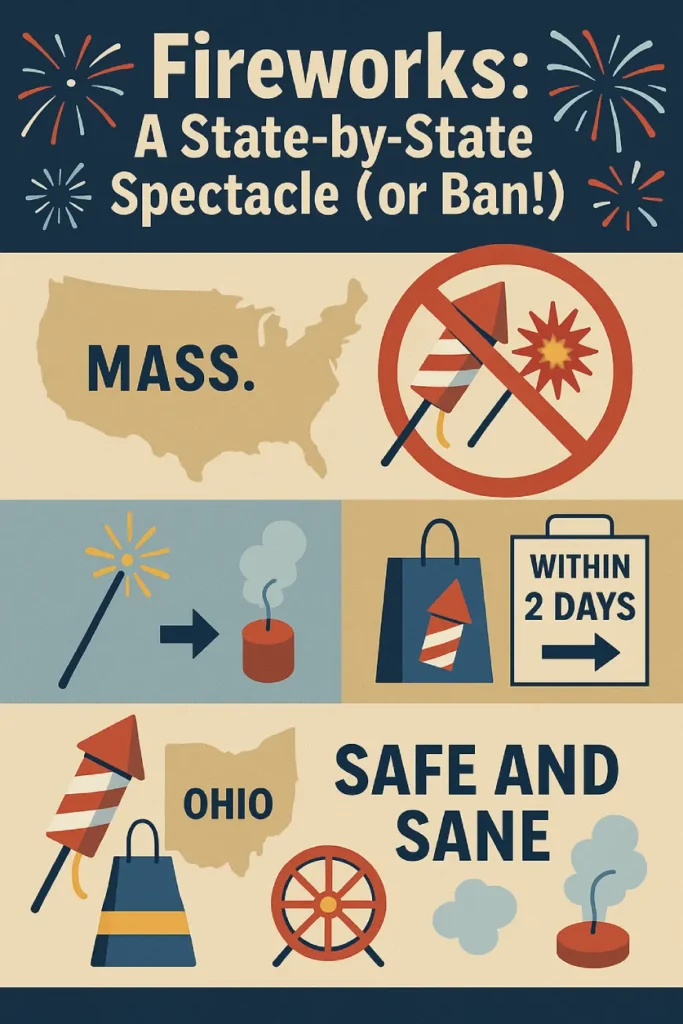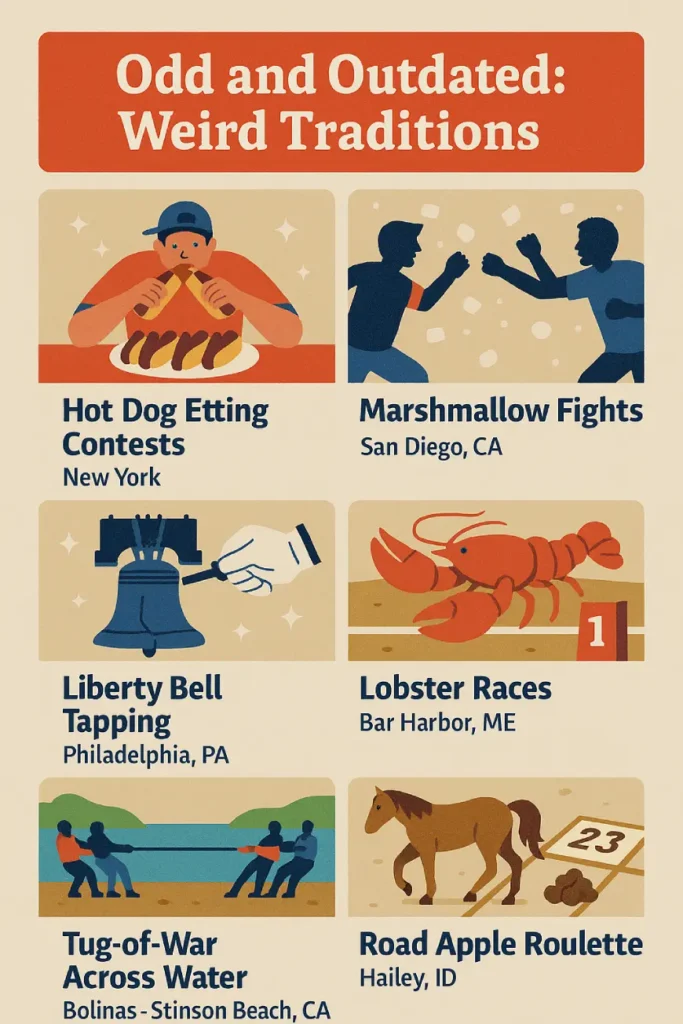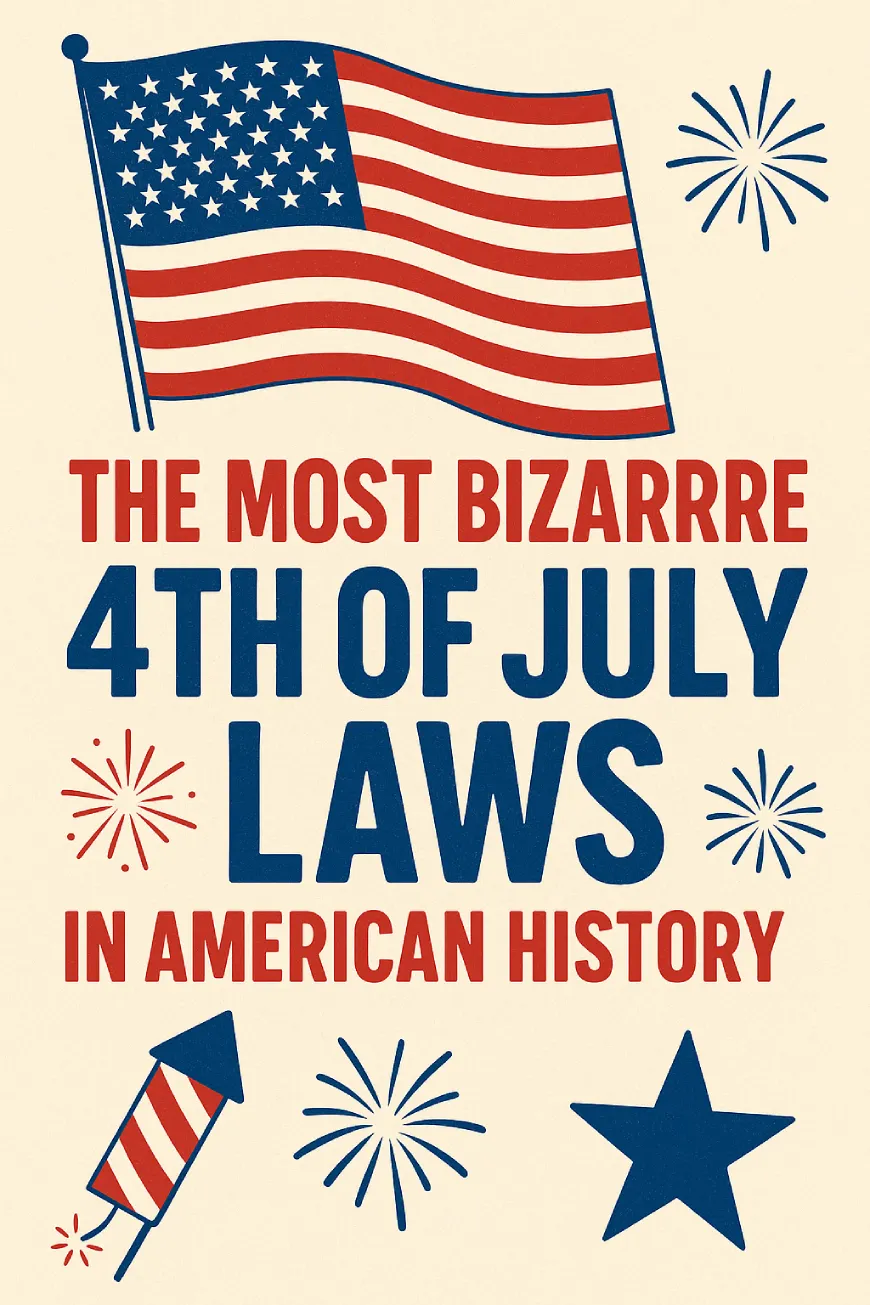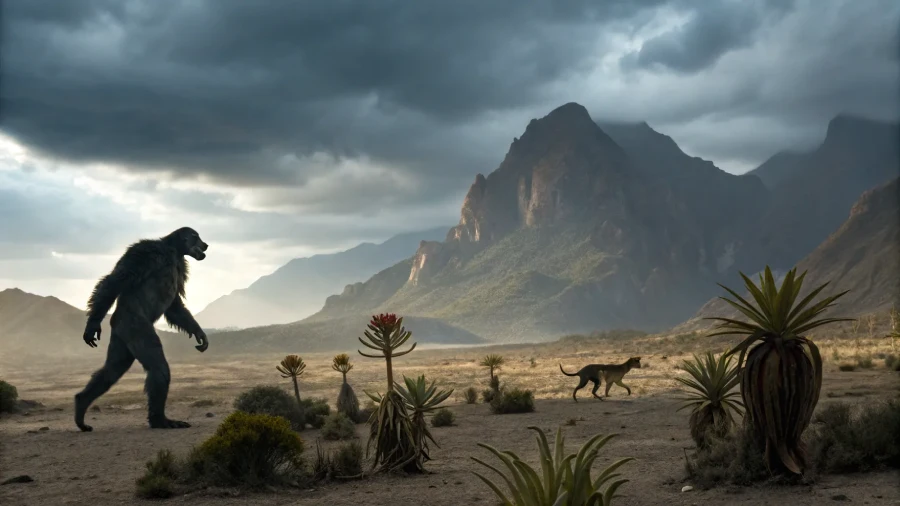The Fourth of July is one of the most exciting and patriotic days in the United States. People gather for fireworks, parades, barbecues, and more. But did you know that some places have had strange laws or unusual traditions tied to this holiday? While many of these laws are outdated or not enforced anymore, they give us a funny, sometimes surprising look into the past.
Let’s explore some of the weirdest 4th of July laws and traditions across America.
Fireworks: A State-by-State Spectacle (or Ban!)

Fireworks are a big part of July 4th, but not everyone celebrates with a bang. Laws about fireworks vary a lot across the country:
- Massachusetts is the only U.S. state where it’s completely illegal for regular people to use any kind of fireworks. This law has been in place since 1943!
- In Illinois and Vermont, you’re only allowed to use tiny items like sparklers and smoke bombs.
- Ohio lets you buy powerful fireworks but says you have to take them out of the state within 48 hours.
- Before 2020 in Florida, you could only buy fireworks if you signed a paper saying you’d use them for farming. Today, they’re legal to use on July 4th, New Year’s Eve, and New Year’s Day.
- Some places allow only “Safe and Sane” fireworks. These include fountains, wheels, and other devices that don’t fly or explode.
Also, in most places:
- You must be at least 12 to 18 years old to buy fireworks.
- You can only set them off during certain times or days.
- You should never mix fireworks and alcohol.
- Even sparklers are dangerous and should only be used under adult supervision.
Strange Local Laws
Some strange laws show up when you look back in history or at local rules:
- In some Ohio towns, laws once said that nobody could be arrested on July 4th or Sundays.
- In Oregon, many cities banned all personal fireworks, even sparklers, to avoid wildfires. Portland made this permanent in 2021.
- In Iowa, a 2025 law now allows fireworks on July 3, 4, and December 31, even if towns want to ban them. This stops the confusing patchwork of different local rules.
Odd and Outdated: Weird Traditions
Some July 4th traditions aren’t laws, but they’re definitely strange, unique, and very entertaining. Here are a few that stand out from across the country:

Nathan’s Hot Dog Eating Contest – New York
Started in 1916, this contest began as a fun bet between four friends who wanted to prove who was the most patriotic by eating the most hot dogs. Today, it’s a major event held at Coney Island, attracting thousands of fans and top competitive eaters. Contestants can eat over 70 hot dogs in just 10 minutes!
Marshmallow Fight – San Diego, California
Ocean Beach used to be the site of a massive marshmallow war. What started as a small family fun tradition grew into a giant, sticky battle involving hundreds of people. After too much mess and damage, the city finally discouraged the event. Now, signs suggest people enjoy marshmallows in their mouths, not in the air.
Liberty Bell Tapping – Philadelphia, Pennsylvania
In the city where the Declaration of Independence was signed, the famous cracked Liberty Bell is gently tapped 13 times on the Fourth of July—once for each of the original 13 colonies. The ceremony is carried out by descendants of the original signers, who wear white gloves and often dress in colonial attire.
Lobster Races – Bar Harbor, Maine
Forget fast cars—in this quirky tradition, lobsters race each other by crawling to the finish line on a specially marked track. People cheer on their chosen lobster, and sometimes even name them. While the race is slow, the fun is fast!
Tug-of-War Across Water – Bolinas & Stinson Beach, California
These two small towns face off across a lagoon in a giant tug-of-war. A rope stretches across the water, and residents from each town compete to pull the other team into the water. It’s all in good fun and brings the communities together every year.
Road Apple Roulette – Hailey, Idaho
This might be one of the strangest fundraisers in the country. During the town’s July 4th parade, horses march through the streets, and people buy squares along the route. If a horse does its business (a “road apple”) in your square, you win a prize! All proceeds go to charity.
These weird traditions remind us that Independence Day is more than just fireworks. It’s about people, community, and creating memories—sometimes very funny ones.
Why Do These Weird Laws and Traditions Exist?
Some of these laws were made a long time ago when safety and noise were big concerns. Others were created to protect animals, pets, veterans, or the environment. And some just grew from local customs that got bigger over time!
What they all show is that Independence Day means different things to different places. Whether it’s fireworks, food fights, or funny parades, Americans have found many creative ways to celebrate their freedom.
Bizarre 4th of July-Related Laws
| Law/Ordinance | Location | Description |
|---|---|---|
| No arrests on July 4th or Sundays | McDonald, PA | Police cannot arrest anyone on these days |
| Running out of gas is illegal | Various | Drivers fined for running out of gas |
| No cherry pie à la mode on Sundays | Topeka, KS | Ice cream on pie banned on Sundays |
| No ice cream trucks | Indianola, IA | Ice cream trucks banned within city limits |
| No parading geese down Main Street | McDonald, PA | Geese parades prohibited |
| Women can’t drive in housecoats | California | Outdated law restricting women’s driving attire |
Conclusion
The Fourth of July is about celebrating freedom, but it’s also about community, fun, and tradition. While laws may seem odd or rules a little strict, they reflect how each place tries to balance safety and celebration.
So wherever you are this July 4th, be sure to check your local laws before lighting up the night—and maybe try a hot dog contest or lobster race instead!
Stay safe, have fun, and happy Independence Day!
FAQs
Can I use fireworks on July 4th anywhere in the U.S.?
No. Each state (and sometimes city) has different rules. Some states like Massachusetts ban all fireworks. Others, like Texas, allow a wide range. Always check local laws before lighting fireworks.
Why are Roman candles illegal in some places?
Roman candles shoot flaming balls and can cause fires or injuries. In dry states like California or places with a lot of homes close together, they are banned for safety reasons.
Are weird July 4th traditions still happening today?
Yes! Many towns proudly continue their unique celebrations, like tug-of-wars or hot dog contests. However, some events, like the marshmallow fight, have stopped due to cleanup or safety issues.
What does “Safe and Sane” fireworks mean?
These are fireworks that don’t fly into the air or explode. They usually stay on the ground and include items like fountains or wheels. They’re seen as safer and are allowed in more places.
What if I break a fireworks law by mistake?
You could get a fine or warning. If you stop using the illegal fireworks and explain you didn’t know, some areas may let it go. But it’s always better to know the rules ahead of time.
Are sparklers safe for kids?
A: Sparklers look fun, but they burn at over 1,000°F. That’s hotter than some blowtorches! Kids should never use them without adults watching closely.
What are some examples of bizarre 4th of July laws in the United States?
Some examples include a ban on arrests in McDonald, Pennsylvania, on the Fourth of July and Sundays, prohibitions against running out of gas in certain towns, and laws against parading geese down Main Street. Other odd laws include bans on ice cream trucks in Indianola, Iowa, and restrictions on eating cherry pie à la mode on Sundays in Topeka, Kansas.
Why do these strange 4th of July laws exist?
Most of these laws were created in response to local concerns about safety, public order, or religious observance. Over time, they have become outdated or are rarely enforced, but they remain on the books as quirky reminders of the past.
Are these bizarre laws still enforced today?
In most cases, these laws are not actively enforced. Many exist as legal curiosities or historical relics, though technically, they could still be cited in some jurisdictions.
Can you really not be arrested on the 4th of July in some places?
In certain towns, such as McDonald, Pennsylvania, there were (or are) laws stating that arrests cannot be made on the Fourth of July or Sundays. However, law enforcement typically has the authority to act if there is a serious crime or emergency.
Are there any food-related laws tied to the Fourth of July?
Yes, one example is an old law in Topeka, Kansas, that banned serving cherry pie with ice cream on Sundays. If the Fourth of July fell on a Sunday, this law would apply.
Why would a town ban ice cream trucks on the Fourth of July?
Indianola, Iowa, has a ban on ice cream trucks, which was implemented due to safety and noise concerns. This affects all days, including the Fourth of July.
What is the strangest animal-related 4th of July law?
A particularly odd law in McDonald, Pennsylvania, prohibits parading a goose down Main Street, which could impact holiday parades or celebrations involving animals.
How do these laws affect modern 4th of July celebrations?
Most of these laws are not enforced today and have little impact on modern celebrations. They are more often cited as humorous or interesting facts about American legal history.
Are there any clothing-related laws for the Fourth of July?
While not specific to the holiday, some outdated laws, such as a ban on women driving in housecoats in California, could theoretically apply if someone celebrated the Fourth of July while wearing prohibited attire.
Where can I find more information about bizarre American laws?
Books, legal archives, and reputable online resources on American legal history often feature collections of unusual laws, including those related to holidays like the Fourth of July.
“Do you know any weird 4th of July traditions from your town? Share them in the comments below!”




